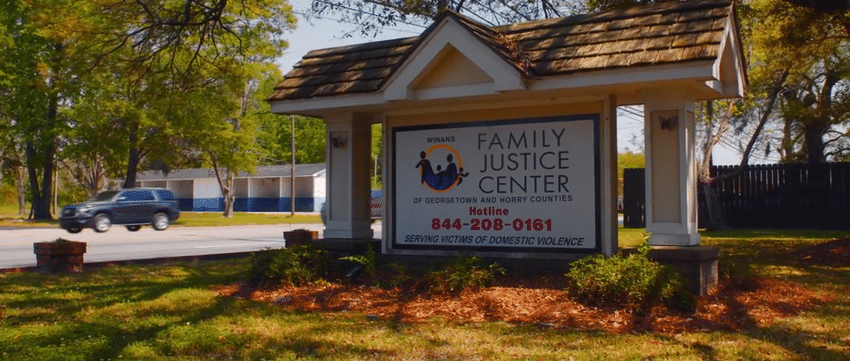Our mission is to reduce the injuries and deaths resulting from domestic violence. We work with local agencies to provide comprehensive, coordinated services to victims of domestic violence and educational programs for our community.
ABOUT US
FAMILY JUSTICE CENTER

You are not alone.
Our Leaders Our Community Your Future
Thanks Solicitor Jimmy Richardson and the Horry County Police Department
Family Justice Center
Governing Board Directory * 2024
-
Jo Ann Crumpler - Chair (1/23 - 1/26)
Richard Culbertson - Past Chair (1/22 - 1/26)
Nancy L. Kolman -Associate Vice Chair (01/07 - 1/26)
Alicia Y. Barnes- Vice Chair, Georgetown (01/08 – 01/26)
Tom Fox- Vice Chair, Horry (1/19 - 1/27)
Mary Watkins - Secretary (1/17 - 1/27)
Michele Moulton - Treasurer (1/22 - 1/26)
-
Robert Jenkot (1/20 – 1/26)
Ina Seethaler (1/25 - 1/27)
Tracy Durant (1/23 - 1/26)
-
Jim Christian (1/19 - 1/27)
Jarrod Ownbey (1/25 - 1/27)
Brian Swinton (1/17-1/27)
Chelice Waites (1/22-1/26)Sheldon Butts (1/22-1/26)
Jessica Dubose (1/23 - 1/26)
-
Tara Hawkinson- Past Treasurer (01/17 – 1/27)
Jackie Broach-Akers (1/13 – 1/27)
Caitlin Lang (1/18 – 1/26) - daughter of Winans founders of FJC
-
FJC STAFF
Executive Director –
Finance and Operations Director – Sherie Cribb
scribb@fjcgtownhorry.org
Director of Community Engagement & Outreach - Bruce Mallick bmallick@fjcgtownhorry.org
Community Engagement & Outreach Specialist - Tara Ostrander tostrander@fjcgtownhorry.org
Counselor Georgetown Office – Donna Watkins
dwatkins@fjcgtownhorry.org
Counselor Horry County Office – Angela Lawrence
alawrence@fjcgtownhorry.org
Counselor Horry County Office – Emily Tunstall
etunstall@fcjgtownhorry.org
Case Manager Georgetown – Joyce Linnen
jlinnen@fjcgtownhorry.org
Case Manager Horry County Office – JoAnn Trujillo
jtrujillo@fjcgtownhorry.org
Court Advocate Georgetown – Mada Grate
mgrate@fjcgtownhorry.org
Court Advocate Horry County – Deidre Calciano
dcalciano@fjcgtownhorry.org
Georgetown Shelter Manager -- Kristina Miller
kmiller@fjcgtownhorry.org
Georgetown Shelter Services Staff – Kathleen Linen
klinen@fjcgtownhorry.org
Georgetown Shelter Services Staff – Calanda Linen
clinen@fjcgtownhorry.org
Georgetown Shelter Services Staff – Danielle Jefferson
djefferson@fjcgtownhorry.org
Georgetown Shelter Services Staff – Makayla McClellan
mmcclellan@fjcgtownhorry.org
Georgetown Shelter Services Staff – Whitney Rebstock
wrebstock@fjcgtownhorry.org
Supporter Partners and Friends
Power and Control Wheel
Domestic violence is a pattern of behaviors used to gain or maintain power and control. At The Hotline, our frame of reference for describing abuse is the Power and Control Wheel created by the Domestic Abuse Intervention Project in Duluth, MN. The Power and Control Wheel diagram below assumes she/her pronouns for survivors and he/him pronouns for partners. However, the abusive behavior it details can happen to people of any gender or sexuality.
Moreover, the wheel diagram serves as a tactic abusive partners use to keep survivors in a relationship. The inside of the wheel makes up subtle, continual behaviors over time, while the outer ring represents physical and sexual violence. Thus, abusive actions like those depicted in the outer ring reinforce the regular use of other, more subtle methods found in the inner ring.
Healthy Relationships
Healthy relationships are based on equality & respect You make decisions together and can openly discuss whatever you’re dealing with, like relationship problems and sexual choices. You enjoy spending time together but can be happy apart.
Unhealthy Relationships
Unhealthy relationships are based on attempts to control the other person - One person tries to make most of the decisions. He or she may pressure their partner about sex or refuse to see how their actions can hurt. In an unhealthy relationship, you feel like you should only spend time with your partner.
Abusive Relationships
Abusive relationships are based on an imbalance of power & control - One person is making all the decisions—about sexual choices, friend groups, boundaries, even what’s true and what’s not. You spend all of your time together and feel like you can’t talk to other people, especially about what’s really happening in your relationship.































